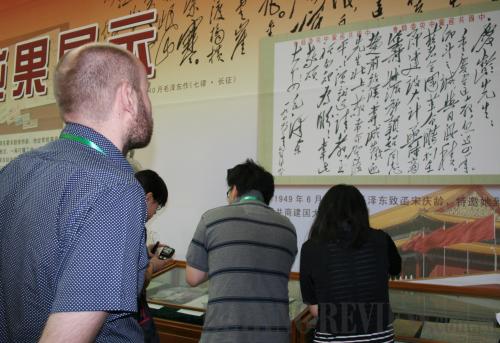|
 |
|
A PIECE OF HISTORY: A foreign reporter reads a letter put up on the wall of an exhibition hall of the Central Archives. The letter was written by Mao Zedong to Soong Ching-ling, widow of Dr. Sun Yat-sen, shortly before the founding of the People's Republic of China in 1949 (YU XIAOJIE) |
It is not just government departments, individuals have also used archives to protect their rights, said Li Xiaoming, Director of the Central Archives' Science and Technology Department.
In the late 1970s when China implemented the reform and opening-up policy, farmers were given contracts, which allowed them exclusive use of parcels of rural land. These land contracts were filed with the archival institutions. Decades later when the land contracts were to be renewed, many farmers could not find their original contracts. The copies stored in county-level archives enabled farmers to renew their land usage rights.
"When the government started the forest ownership reform in 2006, archival institutions also kept forest contracts for future reference," Li said.
To fully realize the value of archives, "we have tried every means to provide services to all sectors of society and to meet the needs of the public," Yang said.
More than 5,418 people from 1,900 institutions used the Central Archives' holdings in the past five years, according to its statistics.
Users include work groups entrusted to compile collected works, year books or biographies and histories of Party and state leaders. Some scholars, cultural workers as well as ordinary citizens have also used the records for research or other purposes.
In addition to receiving on-site visitors, the Central Archives provides a number of other services to the public. It delivers consulting services to the public upon request, organizes exhibitions to commemorate important historical events, publishes books, newspapers, journals, CDs and video clips, and even produces documentary films.
At present, about 40 percent of the Central Archives' holdings are open to the public. To access declassified records, Chinese citizens need to show their identity cards and research achievements in a related field along with letters of introduction from their employers; to access classified documents, the applicants must get approval from the relevant organizations such as the General Office of the provincial level government.
"In recent years, more and more ordinary citizens have used archives," said Guo Siping, the Central Archives' spokeswoman. She explained most documents accessed by ordinary citizens are related to their own rights and interests, such as real property records, marriage records and registered permanent residence records.
Guo also said any foreign national or organization is permitted to access the archived documents in China after getting approval from the archival institution holding the records.
The Central Archives determines whether a record should be open to the public primarily according to the provisions of the Archives Law and the regulations on its implementation.
The law, enacted in 1987 and amended in 1996, states documents held by the Central Archives' should be open to the public 30 years after their creation. Economic, scientific, technological and cultural records can be declassified sooner than 30 years; whereas archives unsuitable for public access, such as those concerning national security and other significant national interests of importance to national security and defense, foreign affairs, religion and personal privacy, shall be restricted for more than 30 years.
"All records created before 1949 were opened to the public in November 1990 and of those created after 1949, some remain classified because of their significance in national security and international relations," Guo said.
She explained records may not be opened to the public if they involve privacy, commercial secrets, ethnic disputes, intellectual property rights, or if they are simply not well preserved enough for public access.
But Professor Shen said China's archives authorities tend to be too conservative in opening records.
"Many people in archival institutions still stick to the old way of thinking. They believe their duty is to keep rather than preserving records for public use," Shen said.
He also calls for the reform of China's archival management system to separate archive preservation from declassification.
"When an agency entrusted to preserve the records can determine whether to open the records to the public, it does not have an incentive to provide these records, for denying access can save them trouble," Shen said.
"Providing information to the public is an important part of our job. We will try our best to use our current resources to meet people's need for archival information," Guo said. She said China's archival institutions were making efforts to improve the accessibility of the archives. One such effort is to digitize declassified archival information, and make the information available on the Internet.
The Central Archives was founded in 1954. It is responsible for collecting, arranging, preserving and providing access to documents with long-term value. All documents held by the Central Archives are the archives of the Communist Party of China and the People's Republic of China,
The archives generated by the regimes in power before 1949 are stored at two other sites. The No.1 Historical Archives preserves records of the Ming (1368-1644) and Qing (1644-1911) dynasties. The No.2 Historical Archives houses those of the Republic of China period (1911-49).
The Central Archives is also responsible for administering archival work throughout the country.
In addition to the Central Archives, administrative divisions at and above the county-level in China all have their respective archives.
As of 2009, China had 31 archives at the provincial level, 420 at the prefecture level and 2,737 at the county level. | 